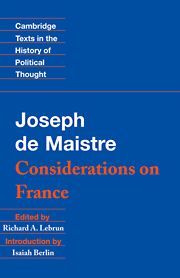Book contents
- Frontmatter
- Contents
- Note on the Introduction
- Introduction
- Chronology
- Bibliography
- Note on the text
- Considerations on France
- 1 Of Revolutions
- 2 Reflections on the Ways of Providence in the French Revolution
- 3 On the Violent Destruction of the Human Species
- 4 Can the French Republic Last?
- 5 The French Revolution Considered in its Antireligious Character
- 6 On Divine Influence in Political Constitutions
- 7 Evidence of the Incapacity of the Present French Government
- 8 Of the Old French Constitution
- 9 How Will the Counter-Revolution Happen if it Comes?
- 10 On the Supposed Dangers of a Counter-Revolution
- 11 From a History of the French Revolution by David Hume
- Postscript
- Index
- Cambridge texts in the history of political thought
Introduction
Published online by Cambridge University Press: 05 June 2012
- Frontmatter
- Contents
- Note on the Introduction
- Introduction
- Chronology
- Bibliography
- Note on the text
- Considerations on France
- 1 Of Revolutions
- 2 Reflections on the Ways of Providence in the French Revolution
- 3 On the Violent Destruction of the Human Species
- 4 Can the French Republic Last?
- 5 The French Revolution Considered in its Antireligious Character
- 6 On Divine Influence in Political Constitutions
- 7 Evidence of the Incapacity of the Present French Government
- 8 Of the Old French Constitution
- 9 How Will the Counter-Revolution Happen if it Comes?
- 10 On the Supposed Dangers of a Counter-Revolution
- 11 From a History of the French Revolution by David Hume
- Postscript
- Index
- Cambridge texts in the history of political thought
Summary
Joseph de Maistre was a very frightening figure to many of his contemporaries – frightening because of what he wrote rather than because of what he was. Indeed his contemporaries had not very much chance of meeting him, since the most important years of his life were spent in the service of the King of Sardinia, and at the court of St Petersburg, to which he was appointed as diplomatic representative. He was frightening to them because of the violence, the intransigence and the extremely uncompromising and hard-headed dogmatism with which he wished to strike down the doctrines of which he disapproved.
The normal view of him is fairly stated by Émile Faguet, perhaps the most accurate and the fairest-minded critic of Maistre in France in the nineteenth century. He calls Maistre ‘a fierce absolutist, a furious theocrat, an intransigent legitimist, apostle of a monstrous trinity composed of Pope, King and Hangman, always and everywhere the champion of the hardest, narrowest and most inflexible dogmatism, a dark figure out of the Middle Ages, part learned doctor, part inquisitor, part executioner’. And again, ‘his Christianity is terror, passive obedience and the religion of the State’; his faith is merely ‘a slightly touched-up paganism’; he is a ‘Praetorian of the Vatican’. An admirer speaks of his ‘Christianity of terror’; Edgar Quinet, a Protestant under the influence of the German romantics, writes of Maistre's ‘inexorable God aided by the hangman; the Christ of a permanent Committee of Public Safety’; and in our own day the Spanish philosopher Miguel de Unamuno refers to Maistre's ‘slaughter-house’.
- Type
- Chapter
- Information
- Maistre: Considerations on France , pp. xi - xxxivPublisher: Cambridge University PressPrint publication year: 1994



